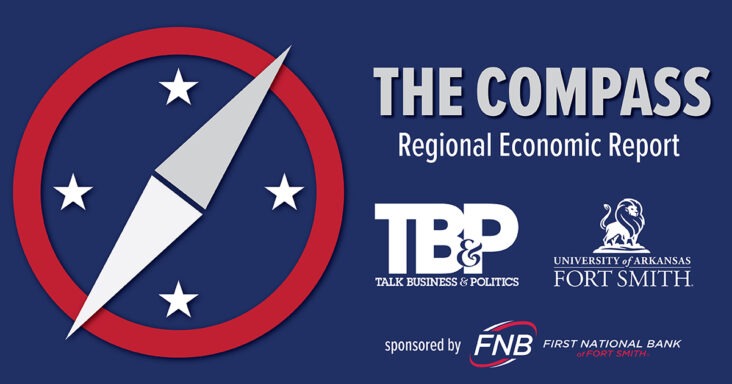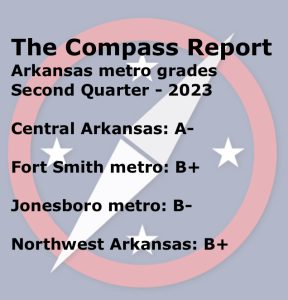The Compass Report: Job growth, tax revenue remains strong in Arkansas’ top metro areas
by September 21, 2023 6:31 pm 1,314 views

Continued job growth and broad gains in sales tax revenue indicate resilient and healthy economies in Arkansas’ four top metro areas, according to the second quarter 2023 The Compass Report. The report also shows “modest” growth in the U.S. economy.
The Compass Report is a partnership between the University of Arkansas at Fort Smith and Talk Business & Politics. First National Bank of Fort Smith is a sponsor of the statewide report.
The report measures four leading and four current economic indicators to provide a grade for a regional economy. The eight categories measured to determine The Compass Report grade in the Central Arkansas, Fort Smith and Northwest Arkansas areas are total nonfarm jobs, unemployment rate, building permits, sales tax revenue, manufacturing jobs, service sector jobs, construction jobs, tourism jobs and concentration of manufacturing jobs. Because the data is not available, construction and tourism jobs are not included in the Jonesboro metro grade.
In the second quarter 2023 report, Central Arkansas received a “A-” grade, the Fort Smith metro had an “B+” grade, the Jonesboro area received a “B-” grade, and Northwest Arkansas had an “B+” grade.
A key factor in understanding the report is in understanding the “grading” approach used to measure the current and leading economic indicators. For example, a grade of “C” reflects no change in economic activity. The grades “B” or “A” indicate improvement above the historical average, and “D” and “F” indicate a decline in economic activity compared to the historical average.
Kendall Ross, executive director of the University of Arkansas at Fort Smith Center for Economic Development, said the increase in real gross domestic product (GDP) in the second quarter was driven by rises in consumer spending, nonresidential fixed investment, state and local government spending, and federal government spending.

“The average of real GDP and real gross domestic income (GDI), a supplemental measure of U.S. economic activity, increased by 1.3 percent in the second quarter, a significant improvement from the 0.1 percent increase in the first quarter,” Ross noted in his report. “These key takeaways suggest that the U.S. economy experienced modest growth in the second quarter, with positive contributions from various sectors, but with some areas of concern such as price inflation and changes in corporate profits.”
Greg Kaza, an economist and executive director of the Arkansas Policy Foundation, said the second quarter data shows a healthy state and national economy despite inflation pressures.
“The latest Compass Report provides more evidence that Arkansas, like the national economy is in an expansion, not a recession. Nonfarm payroll employment, the broadest state- and local-level indicator increased in all four regions (Fort Smith, Northwest, Central, and Jonesboro), while unemployment rates remain near record lows. The biggest problem remains persistent inflation, the responsibility of the central bank. The economy won’t appear as a good times expansion to everyone until the Fed achieves its long-run inflation target of two percent (2%),” Kaza said.
Following are some of Ross’ key takeaways in the four metro areas.
Central Arkansas
Central Arkansas is experiencing a positive economic outlook with a declining unemployment rate, a notable increase in nonfarm employment, and solid growth in various sectors. While the construction industry faces challenges with declining building permit valuations, overall employment expansion and strong gross sales and use tax collections underscore a thriving economic environment. The region’s grade stands at A- for the second quarter, reflecting its favorable employment trends and low unemployment rate.
 Northwest Arkansas
Northwest Arkansas
Northwest Arkansas Metro’s Q2 2023 economic outlook earns a B+ grade, driven by robust non-farm employment growth at 5.1% and notable gains in several sectors. While the housing construction sector declined, June 2023 saw a temporary uptick. The region boasts a low 2.3% unemployment rate, the state’s lowest, reflecting a thriving job market. A 3.5% labor force growth indicates an expanding workforce. Quarter-to-quarter comparisons reveal a positive trend in gross sales and use tax collections, signaling economic expansion. Overall, Northwest Arkansas offers a favorable economic environment marked by employment growth, low unemployment, and an expanding workforce, fostering a promising regional outlook.
Fort Smith region
In the Fort Smith region during April-June 2023, the economic landscape displayed resilience and growth, earning the Fort Smith Metro an impressive grade of B+ for the second quarter of 2023. Key indicators included significant job gains in various sectors, a steady climb in manufacturing employment, and a notable increase in residential construction valuation. Tax collections also demonstrated a positive trend, reflecting economic stability. These factors collectively indicated a promising economic environment with potential for further regional rejuvenation.
Jonesboro
The Jonesboro MSA exhibits positive economic conditions in the second quarter of 2023. The region boasts a strong employment landscape, with a commendable decrease in the unemployment rate and notable workforce expansion. Nonfarm employment continues to grow, setting records in May 2023. However, there is a concerning trend in declining building permit valuations, highlighting challenges in the construction sector. On the bright side, gross sales and use tax collections show robust growth, reflecting a thriving economy. The overall economic outlook for the Jonesboro Metro receives a B- grade, with strong employment and tax collection indicators tempered by construction sector challenges.
Link here for the second quarter 2023 raw data gathered by the University of Arkansas at Fort Smith Center for Economic Development.
Link here for the quarterly narrative.
